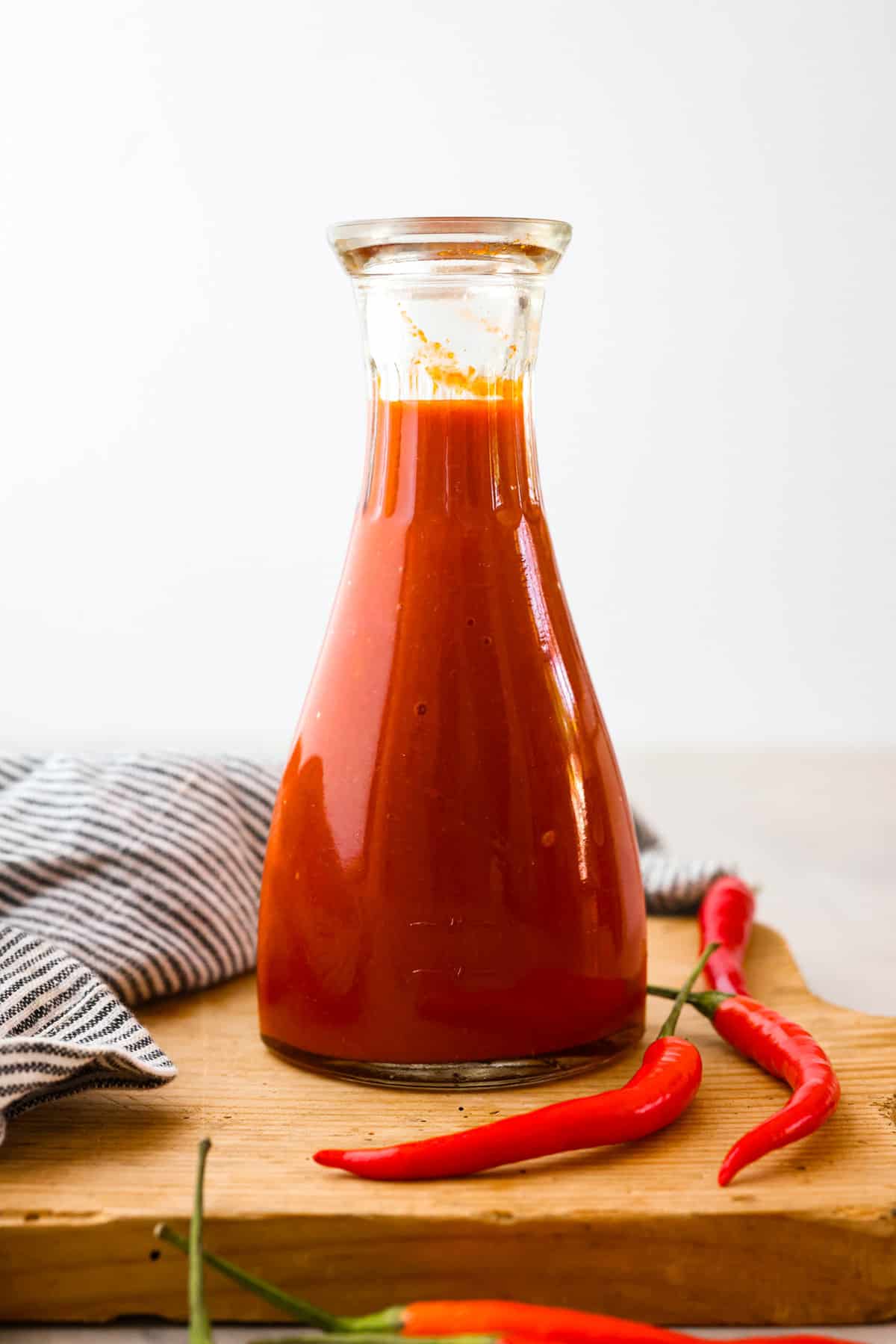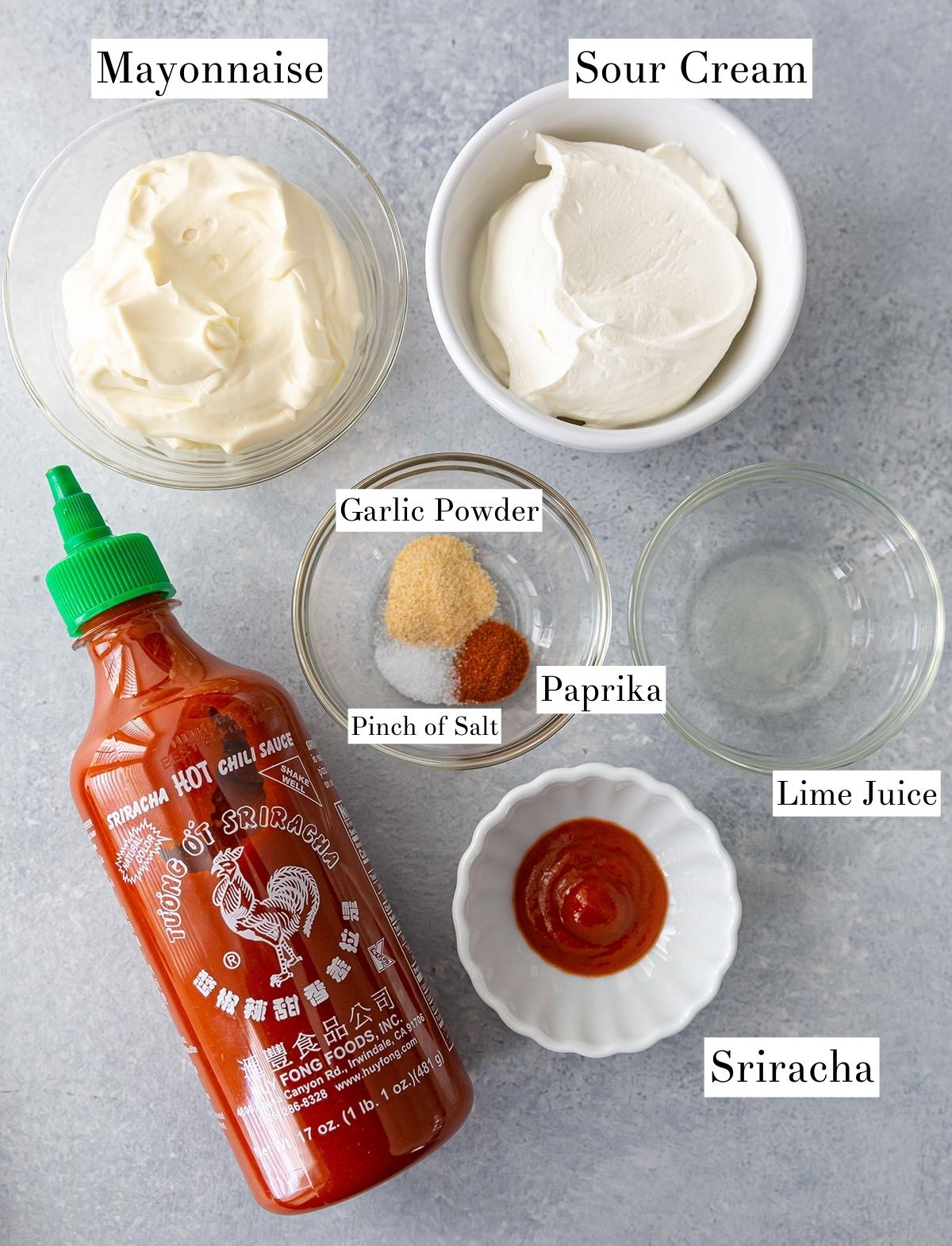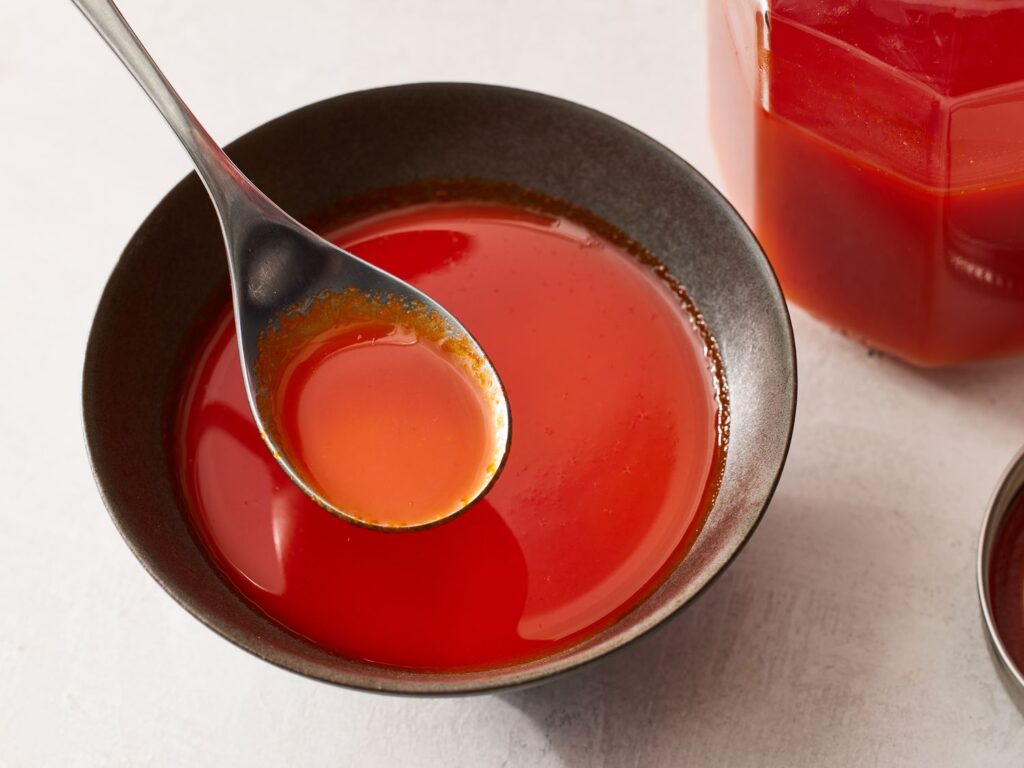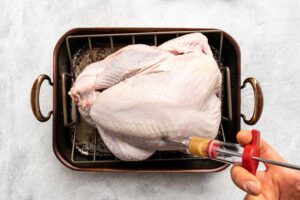Hot sauces add flavor and spice to our dishes. Homemade Sriracha sauce is no exception.
Making Sriracha at home lets you control the ingredients. It’s fresh, flavorful, and easy to make. Store-bought sauces often contain preservatives and additives. Homemade versions use only the best, freshest ingredients. You can adjust the heat level to your liking.
The process is simple and fun. Plus, it’s a great way to impress friends and family. Ready to learn more? Let’s dive into the world of homemade Sriracha sauce and discover how you can make this popular condiment right in your kitchen.

Credit: savouredkitchen.com
Introduction To Homemade Sriracha
Spicy, tangy, and a bit sweet, Sriracha sauce has become a kitchen staple. Making your own Sriracha at home can be a fun and rewarding experience. This homemade version allows you to control the ingredients, ensuring a fresh and personalized taste. Plus, it’s a great way to impress family and friends with your culinary skills.
History Of Sriracha
The origins of Sriracha can be traced back to Thailand. A woman named Thanom Chakkapak first created this sauce in the town of Si Racha in the 1930s. Since then, Sriracha has grown in popularity worldwide. Today, it is commonly used in various dishes, from noodles to burgers.
Why Make Your Own
There are several reasons to make your own Sriracha sauce at home:
- Freshness: Homemade Sriracha is free from preservatives and additives.
- Customization: You can adjust the heat level to suit your taste.
- Cost-effective: Making your own sauce can save you money.
- Healthier: Control the amount of salt and sugar in your sauce.
Making Sriracha at home is not only easy but also a fun project. With just a few ingredients and some patience, you can create a sauce that rivals store-bought versions.

Credit: therecipecritic.com
Ingredients Needed
Making your own Sriracha sauce at home is both fun and rewarding. The secret lies in the ingredients. Each ingredient adds its own unique flavor to the sauce. Below, we’ll cover the essential ingredients needed.
Fresh Chilies
The primary ingredient in Sriracha sauce is fresh chilies. They provide the heat and color. Here are some options:
- Red Jalapeños – These are ideal for their balance of heat and flavor.
- Fresno Chilies – Slightly milder than jalapeños, with a bright red color.
- Thai Chilies – These are smaller and much hotter, for those who love extra spice.
Other Key Ingredients
Besides chilies, several other ingredients are essential to make authentic Sriracha sauce. Each ingredient plays an important role:
| Ingredient | Role |
|---|---|
| Garlic | Adds a rich, savory flavor. |
| Vinegar | Provides the tangy taste and acts as a preservative. |
| Sugar | Balances the heat with sweetness. |
| Salt | Enhances all the flavors. |
For a quick overview, here’s a list of the basic ingredients:
- Fresh Chilies (Red Jalapeños, Fresno, or Thai Chilies)
- Garlic
- Vinegar
- Sugar
- Salt
Gather these ingredients, and you’re ready to start making your own Sriracha sauce. Freshness is key to achieving that vibrant flavor.
Essential Equipment
Creating your own homemade Sriracha sauce can be a rewarding experience. To achieve the best results, you need the right tools. Using the right equipment ensures your sauce has the perfect texture and flavor. Let’s explore the essential equipment you’ll need.
Blenders And Processors
A high-quality blender or food processor is crucial. These tools help you achieve a smooth and consistent sauce. The following table highlights some popular choices:
| Equipment | Features |
|---|---|
| High-Speed Blender | Powerful motor, smooth blending |
| Food Processor | Versatile, easy to clean |
| Immersion Blender | Portable, easy storage |
Choose a tool that suits your needs and kitchen space. A powerful motor ensures smooth blending. A food processor offers versatility for other recipes.
Storage Containers
Proper storage keeps your Sriracha sauce fresh and flavorful. Airtight containers are essential. Consider these options:
- Glass Jars: Easy to clean, non-reactive
- Plastic Containers: Lightweight, durable
- Squeeze Bottles: Convenient for dispensing
Use glass jars for long-term storage. Plastic containers work well for short-term use. Squeeze bottles are great for daily use.
Ensure all containers are airtight to maintain freshness. Label them with the date made. This helps you keep track of their shelf life.
Preparation Steps
Creating your own homemade Sriracha sauce is an exciting culinary adventure. By following these simple preparation steps, you can enjoy a flavorful, spicy sauce that perfectly complements your favorite dishes. Let’s dive into the preparation process, focusing on prepping the chilies and combining the ingredients.
Prepping The Chilies
The first step in making Sriracha sauce is to prepare the chilies. Choose fresh red chilies for the best results. Jalapeños or red Thai chilies work well.
- Wash the chilies thoroughly to remove any dirt.
- Remove the stems and discard them.
- Slice the chilies lengthwise to expose the seeds.
- Decide on the heat level you want. For a milder sauce, remove the seeds and membranes. For a spicier kick, leave them in.
Once prepped, set the chilies aside. You are now ready to combine the ingredients.
Combining Ingredients
With the chilies prepped, gather the remaining ingredients for your sauce. You will need:
- 1 cup of white vinegar
- 1/2 cup of water
- 4 cloves of garlic
- 2 tablespoons of sugar
- 1 tablespoon of salt
Follow these steps to combine the ingredients:
- In a blender, add the prepped chilies, garlic, vinegar, water, sugar, and salt.
- Blend until smooth. The mixture should be thick and bright red.
- Pour the mixture into a saucepan and bring to a simmer over medium heat.
- Reduce the heat and let it cook for about 5-10 minutes, stirring occasionally.
- Once cooked, let the sauce cool to room temperature.
After cooling, transfer the sauce to a glass jar or bottle. Store it in the refrigerator for up to a month. Enjoy your homemade Sriracha sauce with your favorite meals!
Fermentation Process
The fermentation process is a key step in making homemade sriracha sauce. It not only enhances the flavor but also adds depth and complexity. This process involves natural bacteria breaking down the sugars in the peppers. The result is a tangy, spicy sauce that is rich in probiotics.
Why Fermentation Is Important
Fermentation is crucial for flavor development. It creates unique taste profiles that you can’t achieve otherwise. The natural bacteria produce lactic acid. This acid gives sriracha its signature tangy flavor. It also helps in preserving the sauce for longer periods.
Another benefit is the health aspect. Fermented foods are rich in probiotics. These are good bacteria that aid in digestion and boost the immune system. Fermenting your sriracha ensures you get these health benefits with every spoonful.
Fermentation Techniques
There are several ways to ferment your sriracha sauce. Here are some common techniques:
- Salt Brine Fermentation: This involves submerging the pepper mash in a saltwater solution. The salt inhibits bad bacteria, allowing good bacteria to thrive.
- Dry Salt Fermentation: Mix the pepper mash with salt. The salt draws out moisture, creating a natural brine. This method is quicker and often preferred for homemade recipes.
For both techniques, it’s important to use non-iodized salt. Iodized salt can kill the beneficial bacteria needed for fermentation. Keep the mixture in a clean, airtight container. Store it in a cool, dark place for about a week. Check daily for signs of fermentation, like bubbles and a tangy smell.
| Technique | Ingredients | Time |
|---|---|---|
| Salt Brine Fermentation | Peppers, non-iodized salt, water | 7-10 days |
| Dry Salt Fermentation | Peppers, non-iodized salt | 5-7 days |
After fermentation, blend the mixture until smooth. Strain it to remove seeds and skins. Your homemade sriracha is now ready to enjoy!

Credit: bestappetizers.com
Blending And Bottling
Creating your own homemade Sriracha sauce is a fun and rewarding experience. One of the most crucial steps in this process is blending and bottling. This section will guide you through achieving the perfect consistency and proper bottling methods.
Achieving The Perfect Consistency
First, blend the ingredients until smooth. Use a high-speed blender for best results. Ensure there are no chunks. The sauce should be thick but pourable.
If your sauce is too thick, add water. Do this gradually, a teaspoon at a time. Blend after each addition. For a thinner sauce, blend longer or add more vinegar.
Strain the blended sauce. Use a fine mesh sieve. This will remove any remaining solids. The result should be a silky-smooth sauce.
Proper Bottling Methods
Before bottling, sterilize your bottles. Boil them in water for 10 minutes. Let them air dry completely.
Fill each bottle using a funnel. Leave a little space at the top. This allows for expansion.
Seal the bottles tightly. Store them in the refrigerator. Homemade Sriracha sauce can last for up to six months if stored properly.
Here are some tips for proper bottling:
- Use glass bottles for better preservation.
- Label your bottles with the date of preparation.
- Keep the sauce away from direct sunlight.
Storage Tips
Proper storage of your homemade Sriracha sauce ensures it stays fresh and flavorful. By following these guidelines, you can enjoy your spicy creation for an extended period. Let’s dive into the key aspects of storing your Sriracha sauce.
Shelf Life
Homemade Sriracha sauce can last quite a while if stored correctly. Typically, it remains fresh for up to six months. The shelf life mainly depends on the ingredients used and storage conditions.
Using fresh peppers and proper fermentation techniques can extend the sauce’s lifespan. Always check for signs of spoilage before using the sauce.
Optimal Storage Conditions
To keep your Sriracha sauce in top condition, store it in an airtight container. Glass jars with tight-fitting lids work best. Ensure the container is clean and dry before filling it with your sauce.
Store the sauce in the refrigerator to maintain its freshness. The cool temperature slows down the fermentation process, preserving the flavor and quality.
If you prefer a thicker consistency, let the sauce sit at room temperature for a few days before refrigeration. This step helps the flavors meld together.
Here is a quick reference table for optimal storage conditions:
| Storage Method | Temperature | Duration |
|---|---|---|
| Refrigeration | Below 40°F (4°C) | Up to 6 months |
| Room Temperature | 60-70°F (15-21°C) | Few days (for thickening) |
Following these tips will help you make the most of your homemade Sriracha sauce. Enjoy the tangy, spicy goodness in every bite!
Creative Uses For Sriracha
Sriracha is not just a spicy condiment. It’s a versatile ingredient that can elevate many dishes. From breakfast to dinner, this fiery sauce can add a unique flavor to your meals. Let’s explore some creative ways to incorporate Sriracha into your cooking.
Incorporating Into Recipes
Sriracha can easily be added to a variety of recipes. Here are some ideas:
- Scrambled Eggs: Add a few drops to your morning eggs for a spicy kick.
- Marinades: Mix Sriracha with soy sauce, honey, and garlic for a flavorful marinade.
- Sauces: Stir Sriracha into mayonnaise or yogurt to create a spicy dipping sauce.
These simple additions can transform ordinary dishes into something special.
Unique Culinary Ideas
Looking for unique ways to use Sriracha? Consider these options:
- Sriracha Popcorn: Drizzle melted butter mixed with Sriracha over freshly popped popcorn.
- Spicy Chocolate: Add a few drops of Sriracha to melted chocolate for a surprising twist.
- Sriracha Ice Cream: Mix Sriracha into vanilla ice cream for a sweet and spicy treat.
These creative ideas can surprise and delight your taste buds.
Using Sriracha in these ways can enhance your dishes and bring new flavors to your table. Experiment and find your favorite way to enjoy this spicy sauce.
Troubleshooting Common Issues
Making Homemade Sriracha Sauce can be a fun and rewarding experience. Yet, sometimes you may encounter some issues. This section helps you troubleshoot common problems. From adjusting the spiciness to correcting texture problems, we’ve got you covered.
Adjusting Spiciness
If your sauce is too spicy or not spicy enough, don’t worry. There are easy fixes to get the perfect heat level.
- Too Spicy: Add more sweet ingredients like sugar or honey. You can also add more tomatoes or bell peppers to reduce the heat.
- Not Spicy Enough: Add more chili peppers. Be careful and add them gradually. Taste as you go to avoid making it too spicy.
Correcting Texture Problems
Texture can make or break your sauce. Here are ways to fix common texture issues.
| Problem | Solution |
|---|---|
| Too Thick | Add a little water or vinegar. Stir well until you reach the desired consistency. |
| Too Thin | Cook the sauce longer to evaporate excess water. Alternatively, add a thickening agent like cornstarch. |
These simple tips can help you create the perfect homemade sriracha sauce. Enjoy the process and the delicious results!
Frequently Asked Questions
What Ingredients Are In Homemade Sriracha Sauce?
Homemade Sriracha sauce typically includes red chili peppers, garlic, vinegar, sugar, and salt. Fresh ingredients ensure the best flavor.
How Long Does Homemade Sriracha Sauce Last?
Homemade Sriracha sauce can last up to one month in the refrigerator. Store it in an airtight container.
Can I Adjust The Spice Level In Sriracha?
Yes, you can adjust the spice level by choosing milder or hotter chili peppers. Adjusting the amount of garlic and sugar can also help.
Is Homemade Sriracha Sauce Healthier?
Homemade Sriracha sauce is healthier. It contains fewer preservatives and artificial ingredients compared to store-bought versions.
Conclusion
Making homemade Sriracha sauce is simple and rewarding. It adds a kick to your dishes. Fresh ingredients make all the difference. Enjoy the rich flavors without any preservatives. Share your creation with friends and family. They will love the spicy twist.
Try different peppers for unique tastes. Keep experimenting and find your perfect blend. Homemade Sriracha sauce can become a kitchen staple. Enjoy your culinary journey and happy cooking!




